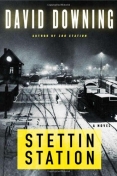BKMT READING GUIDES
Stettin Station
by David Downing
Hardcover : 320 pages
0 club reading this now
0 members have read this book
"Will have readers clamoring for a sequel."BookPage
"A finely drawn portrait of the capital of a nation marching in step toward disaster."St. Louis Post Dispatch
"A beautifully crafted and compelling thriller with a heart stopping ending as John Russell ...
Introduction
Praise for the John Russell series:
"Will have readers clamoring for a sequel."BookPage
"A finely drawn portrait of the capital of a nation marching in step toward disaster."St. Louis Post Dispatch
"A beautifully crafted and compelling thriller with a heart stopping ending as John Russell learns the personal faces of good and evil. An unforgettable read." Charles Todd, author of A Duty to the Dead
"Wonderful. . . . Downing's mingling of history and thrills makes this a must read."Rocky Mountain News
"An extraordinary evocation of Nazi Germany on the eve of war, the smell of cruelty seeping through the clean modern surface."C. J. Sansom, author of Revelation
"An atmospheric tale."St. Petersburg Times
"A welcome new addition to the historical suspense genre. . . . [Downing's] excellent at building suspense . . . and shows a keen eye for describing people and places."The Sacramento Bee
"A page turner."The Palm Beach Post
In the fall of 1941, Anglo-American journalist John Russell is still living in Berlin, tied to the increasingly alien city by his love for two Berliners: his fourteen-year-old son Paul and his longtime girlfriend Effi. Forced to work for both German and American intelligence, he's searching for a way out of Germany. Can he escape and take Effi with him?
David Downing grew up in suburban London. He is the author of numerous works of fiction and nonfiction for both adults and children, including two previous books featuring John Russell--Zoo Station and Silesian Station. He lives with his wife, an American acupuncturist, in Guildford, England.
Excerpt
Ways of leaving BerlinThere was no doubt about it – two years into the war, the Third Reich was beginning to smell.
The U-Bahn was unusually ripe that morning, John Russell thought, though it was only the sheer severity of the pong which gave rise to any surprise. Berliners seemed increasingly reluctant to use the hyper-abrasive standardised soap, which removed both dirt and skin, and there was no alternative to the chemical-rich standardised food, which had created a city-wide epidemic of flatulence. Some laid particular blame on the grey, clayey bread, others on the miracle ingredient which turned the ersatz butter yellow. But whatever the cause, the U-Bahn was the place to experience the consequences, and several of his fellow passengers were travelling with their noses buried deep in scarves and handkerchiefs. ...
Discussion Questions
From the Publisher:1. Stettin Station is set in the last two months of 1941. Why was this a definitive period in the history of the Third Reich?
2. How has the war affected John Russell’s relationship with his son Paul?
3. What reasons might Effi Koenen have for (a) accepting and (b) refusing the movie role of a manipulative Jewess?
4. How central to the plot of Stettin Station is the character Patrick Sullivan? What do you make of this character? Is he sympathetic?
5. To what extent is the plot of Stettin Station dependent on the technology of the time? Would it work, for instance, if mobile phones had already been invented?
6. Why, and in what ways, does John Russell feel ambivalent about the Soviet Union?
7. How important are railroads to the plot and atmosphere of the story? Why do trains often play such an important role in stories set in the first half of the 20th century?
8. Which characters in Stettin Station are ideologically-driven? How do their motivations differ from Russell’s and Effi’s?
9. What persuaded some Berlin Jews to accept ‘resettlement in the East’, when others did not? How do Martin and Lenore Blumenthal exemplify the different ways that German Jews might have viewed their situation?
10. Why does Uwe Kuzorra let Russell go?
Notes From the Author to the Bookclub
Note From the author: Stettin Station is the third book in a four-part series that follows the trials and tribulations of an English journalist and his German family, both before and during World War Two. Its central issue is survival, with decency, in a time and place fraught with dangers to both body and soul. I have always loved adventure stories, and I wanted to write ones in which the hero relied on his brain rather than a facility for violence. I also wanted to ignore convention and dispense with a developing romance; there seemed much more potential in the hero already having a girlfriend, one with a strong personality and qualities that complemented his own. The period setting offers not only great dramatic potential, but also a web of conflicting loyalties—national and ideological—which echoed throughout the twentieth century. Obviously I hope readers will be excited and emotionally engaged by the stories, but I also hope they will come away with a better understanding of the forces which shape people’s lives, both then and now. David DowningBook Club Recommendations
Recommended to book clubs by 0 of 0 members.
Book Club HQ to over 90,000+ book clubs and ready to welcome yours.
Get free weekly updates on top club picks, book giveaways, author events and more








